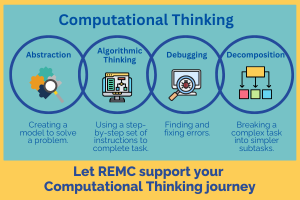REMC has Computational Thinking tools and resources

Computational Thinking is a problem-solving process that enables students to think, learn and create to solve problems. The four pillars at the heart of Computational Thinking are decomposition, pattern recognition, abstraction and algorithm design.
These pillars enable us to think logically about how to organize data and break down the steps to solving a problem. REMC has several courses, lesson plans and classroom activities that build and support computational thinking in classrooms and delivery models. Check out these offerings:
REMC Courses are FREE to take, offer FREE SCECHs and are scheduled for the current school year. Specifically, we have the following courses related to Computational Thinking:
- Assessment Tools for the Classroom - June 2025
- Exploring Formative Assessment Tools - January 2025
- Power Up: Meaningful Data - June 2025
- Coding in the Classroom - May 2025
- Increase Math Engagement with Technology - February 2025
Looking for evidence of your learning? Earn the Computational Thinking for Computer Science Microcredential. You can earn this microcredential by bundling three or more of the courses together and synthesizing your learning into an artifact. We offer several pathways, and you can learn more at: remc.org/professionallearning/remc-microcredential-program/
It’s time to add Computational Thinking into your classroom. REMC has several lesson plans that can help you with this exceptional delivery model:
- MITECS and Computer Science Standards Crosswalks - These resources provide a variety of activities for teachers who are interested in exploring ways to make connections between computer science and grade level curriculum content.
- MiTech Kids Task Cards - These free resources provide classroom technology activities through the form of task cards for grades K-5.
- 21 Things 4 Students - Free activities to integrate technology and build knowledge and
- 21st century skills for middle school grades 5-9.
Promoting STEM Through Literature (PSTL) - These materials help educators use literature to get students excited about science, technology, engineering and math (STEM) by actively involving them in the design thinking
Remember, your local REMC provides additional training and instructional technology tools regionally. Click here to find your local REMC and start utilizing these FREE resources.
